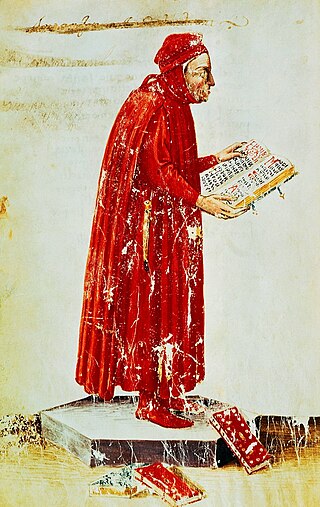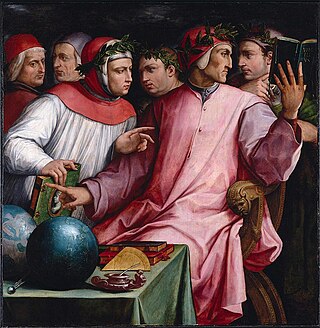Related Research Articles

Niccolò di Bernardo dei Machiavelli, was an Italian diplomat, author, philosopher and historian who lived during the Renaissance. He is best known for his political treatise The Prince, written around 1513 but not published until 1532. He has often been called the father of modern political philosophy and political science.

Coluccio Salutati was an Italian humanist and notary, and one of the most important political and cultural leaders of Renaissance Florence; as chancellor of the Republic and its most prominent voice, he was effectively the permanent secretary of state in the generation before the rise of the Medici.

Leonardo Bruni or Leonardo Aretino was an Italian humanist, historian and statesman, often recognized as the most important humanist historian of the early Renaissance. He has been called the first modern historian. He was the earliest person to write using the three-period view of history: Antiquity, Middle Ages, and Modern. The dates Bruni used to define the periods are not exactly what modern historians use today, but he laid the conceptual groundwork for a tripartite division of history.

Renaissance humanism was a worldview centered on the nature and importance of humanity, that emerged from the study of Classical antiquity. This first began in Italy and then spread across Western Europe in the 14th, 15th, and 16th centuries. During the period, the term humanist referred to teachers and students of the humanities, known as the studia humanitatis, which included the study of Latin and Ancient Greek literatures, grammar, rhetoric, history, poetry, and moral philosophy. It was not until the 19th century that this began to be called humanism instead of the original humanities, and later by the retronym Renaissance humanism to distinguish it from later humanist developments. During the Renaissance period most humanists were Christians, so their concern was to "purify and renew Christianity", not to do away with it. Their vision was to return ad fontes to the simplicity of the Gospels and rediscovery of the New Testament, bypassing the complexities of medieval Christian theology.

The Republic of Florence, known officially as the Florentine Republic, was a medieval and early modern state that was centered on the Italian city of Florence in Tuscany, Italy. The republic originated in 1115, when the Florentine people rebelled against the Margraviate of Tuscany upon the death of Matilda of Tuscany, who controlled vast territories that included Florence. The Florentines formed a commune in her successors' place. The republic was ruled by a council known as the Signoria of Florence. The signoria was chosen by the gonfaloniere, who was elected every two months by Florentine guild members.

Benedetto Accolti was an Italian jurist, humanist and historian.
Classical republicanism, also known as civic republicanism or civic humanism, is a form of republicanism developed in the Renaissance inspired by the governmental forms and writings of classical antiquity, especially such classical writers as Aristotle, Polybius, and Cicero. Classical republicanism is built around concepts such as civil society, common good, civic virtue and mixed government.
Hans Baron was a German-American historian of political thought and literature. His main contribution to the historiography of the period was to introduce in 1928 the term civic humanism.

Guido Tarlati was a lord and Bishop of Arezzo.
Guido Ruggiero is a preeminent historian of the history of Italy, from the fourteenth to seventeenth centuries. He is Professor of History and Cooper Fellow of the College of Arts and Sciences at the University of Miami, Emeritus. A master of Italian archival repositories, his work has forged new paths in the historical analysis of gender, sex, crime, violence, magic, science, and everyday life and culture. His later works also exemplify the fruits of combining the discipline of literary analysis with history. Ruggiero is one of the most prolific and groundbreaking scholars in his field. His monographs include Violence in Early Renaissance Venice, The Boundaries of Eros: Sex Crime and Sexuality in Renaissance Venice, Binding Passions: Tales of Magic, Marriage and Power from the End of the Renaissance, Machiavelli in Love: Sex, Self and Society in Renaissance Italy, The Renaissance in Italy: A Social and Cultural History of the Rinascimento, Love and Sex in a Time of Plague: A Decameron Renaissance. In addition to his own single-authored books, Ruggiero has edited with James Farr Historicizing Life-Writing and Egodocuments in Early Modern Europe ; co-edited and translated with Laura Giannetti Five Comedies from the Italian Renaissance and edited The Blackwell Companion to the Renaissance. He served as both series editor for Studies in the History of Sexuality (1985-2002) for Oxford University Press and co-editor of the six-volume Encyclopedia of European Social History for Scribner’s (2002). With Edward Muir, Ruggiero edited select articles from the Italian journal Quaderni Storici, making them accessible to English-speaking audiences in Sex and Gender in Historical Perspectives, Microhistory and the Lost Peoples of Europe, and History from Crime. Ruggiero has been the recipient of numerous fellowships and academic awards of distinction. Among them are the John Simon Guggenheim Foundation Fellowship, the Robert Lehman Visiting Professor in Residence at Harvard’s Villa I Tatti in Florence, the Rome Scholar in Residence at the American Academy in Rome, and membership in the School of Historical Studies at the Institute for Advanced Studies at Princeton.
Eugenio Garin was an Italian philosopher and Renaissance historian. He was recognised as an authority on the cultural history of the Renaissance. Born at Rieti, Garin studied philosophy at the University of Florence, graduating in 1929, and after a period as professor of philosophy at the liceo scientifico Stanislao Cannizzaro in Palermo and the University of Cagliari, Garin began teaching at his alma mater in 1949 until 1974, then moving to the Scuola Normale di Pisa until his retirement in 1984. The Graduate School of Historical Studies at San Marino was inaugurated with a public lecture by Eugenio Garin on 30 September 1989. Garin was an elected member of both the American Philosophical Society and the American Academy of Arts and Sciences. He also was the editor of the journals Rinascimento and Giornale Critico della Filosofia Italiana.

Arsenio Frugoni (1914–1970) was an Italian medieval historian particularly noted for his influential and innovative work on medieval biography and religious studies.

The Italic League or Most Holy League was an international agreement concluded in Venice on 30 August 1454, between the Papal States, the Republic of Venice, the Duchy of Milan, the Republic of Florence, and the Kingdom of Naples, following the Treaty of Lodi a few months previously. The next forty years were marked by peace and economic expansion based on a balance of power within Italy. The decline of the League brought about the Italian Wars.

Villa I Tatti, The Harvard Center for Italian Renaissance Studies is a center for advanced research in the humanities located in Florence, Italy, and belongs to Harvard University. It houses a collection of Italian primitives, and of Chinese and Islamic art, as well as a research library of 140,000 volumes and a collection of 250,000 photographs. It is the site of Italian and English gardens. Villa I Tatti is located on an estate of olive groves, vineyards, and gardens on the border of Florence, Fiesole and Settignano.
Louis Alexander Waldman is an American art historian and author specializing in the Italian Renaissance.

William John ("Bill") Connell is an American historian and holder of the Joseph M. and Geraldine C. La Motta Chair in Italian Studies at Seton Hall University. He is a leading specialist in Italian history, Early Modern European history and the history of Italian Americans, and he writes broadly on other topics. In 2019 he was named an Andrew Carnegie Fellow.

James Hankins is an American intellectual historian specializing in the Italian Renaissance. He is the General Editor of the I Tatti Renaissance Library and the Associate Editor of the Catalogus Translationum et Commentariorum. He is a professor in the History Department of Harvard University. In Spring 2018, he is a Visiting Research Fellow at the University of Notre Dame Center for Ethics and Culture.
Mario Salmi was an Italian art historian and art critic who specialized in Romanesque architecture, Tuscan sculpture and the early Italian Renaissance.

Ferdinando Giorgetti was a composer, violinist, educator and Italian publicist.
William Caferro is Gertrude Conaway Vanderbilt Professor of History & Professor of Classical and Mediterranean Studies at Vanderbilt University. His expertise is in medieval and Renaissance European history. His publications synthesize economic, military, social, literary, and historical trends.
References
- ↑ "Profile - Faculty of Arts, Humanities and Cultures - University of Leeds - Robert D. Black". Leeds.ac.uk. Retrieved 2 December 2017.
- ↑ "Robert D. Black - Villa I Tatti - The Harvard University Center for Italian Renaissance Studies". Itatti.harvard.edu. Retrieved 2 December 2017.